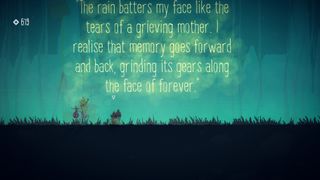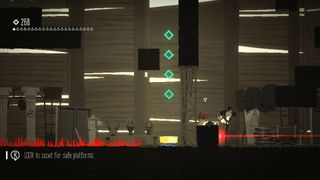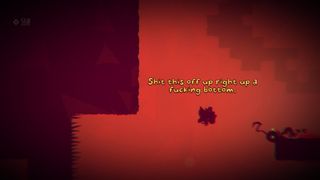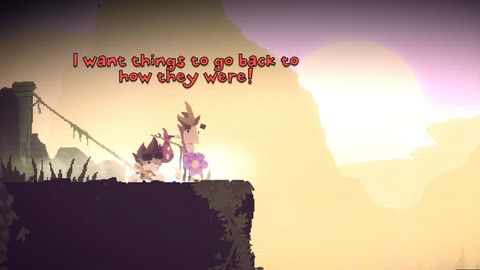Our Verdict
"Not every conspiracy has to be the fucking Templars." If that made you smile, buy with confidence.
PC Gamer's got your back
What is it? Platformer meets point-and-click in the third (and final?) Ben and Dan game.
Expect to pay £15.50/$20
Developer Size Five Games
Publisher Size Five Games
Reviewed on Intel Core i3-8350K CPU, 8GB RAM, GeForce GTX 1060
Multiplayer? No
Link Official site
Genuinely funny games are still something of a rarity. So without wishing to dismiss or overlook the structural ingenuity and genre fluidity of a game that fuses a traditional point-and-click adventure with a modern indie platform-puzzler, the highest praise I can give Lair of the Clockwork God is simply that it made me laugh solidly from start to finish. Its central pair—the witheringly sarcastic alter-egos of creator Dan Marshall and co-writer Ben Ward—would probably despise the phrase 'interactive comedy', so I'll just say that this is a gag delivery device with a seriously good hit rate.
The third game in the Ben and Dan series, belatedly following 2008 freeware debut Ben There, Dan That! and 2009 sequel Time Gentlemen, Please!, opens in a Peruvian jungle, where it immediately establishes its central hook. Ben remains dedicated to the conversational, combinational arts of the point-and-click, whereas Dan has decided to reinvent himself as a contemporary indie platformer hero, on a touching and emotional mission to recover a possibly metaphorical flower that can cure cancer. If you haven't played either of the two previous games, you could be forgiven for thinking you were in for some self-consciously edgy humour with a side of clever-clever postmodernism. But as an early wink to the narcissism of self-insertion proves, it takes care to position its leads as the butt of most of the jokes.

And when I say emotional mission, that's exactly what it becomes. Fast-forward two weeks and Ben and Dan wind up in London, where the capital has taken a turn for the apocalyptic. Here they discover a seemingly friendly AI, which sends them through a series of experimental constructs, harvesting their responses to emotional stimuli in order to better understand humankind.
What follows is an imaginative journey that involves plenty of character-swapping as you make use of their disparate skillsets. Dan can reach places his noodle-legged counterpart can't, while Ben can pick up and combine objects (though, as Dan notes, these days you have to call it crafting) to help his bouncy BFF, including creating a few power-ups—the method of obtaining the sticky gloves that give Dan the ability to wall-grab is one of several lowbrow highlights.
You're rarely more than a minute or two from a witty pun, a snarky one-liner, or a creative sight gag.
In truth, there are minor control issues with both characters. Ben is blighted by an interface that feels slightly fiddly whether you're playing with a pad or M&K—an imperfect solution to the problem of needing to incorporate Dan's conventional platforming setup. And while Dan's platforming sections are creatively designed, he's not exactly Madeline in Celeste in terms of precision and responsiveness. The profusion of checkpoints almost feels like a mea culpa in that regard.

Though the game smartly avoids the irritating pixel-hunts of many a classic point-and-click, the platforming does create a few extra sticking points. Giving Ben a piggyback as Dan speeds up your movement, but it's possible to overlook key environmental features or objects unless you periodically drop him off. You're not always confined to a small locality, nor will you always be aware of which character you should be controlling. Such moments are rare, thankfully, and the dialogue tends to subtly seed clues and hints—though there are a few occasions where you'll find yourself trying out every possible combination of objects in your inventory (not that you ever accrue an unmanageable amount).
Somehow, this stuff hardly matters. It helps that Dan's glee during the platforming set-pieces is surprisingly infectious—just witness his response to his discovery of "left gravity". Besides, any minor annoyances are quickly forgotten when you're rarely more than a minute or two from a witty pun, a snarky one-liner, or a creative sight gag. There are so many jokes that I'm not too concerned about giving a couple away as examples, but since everyone else will be doing that, I'll tread as lightly as I can. Suffice to say, I took notes of 19 different punchlines and payoffs and captured more than a dozen others for posterity as screenshots, and that's barely scratching the surface.
Its sense of humour might be too caustic for some, and its penchant for gross-out won't sit well with others. Still more might be uneasy with the idea of taking pot-shots at other games. Yet the tone is usually either cheeky, affectionate or both. As often as it takes the piss (and I mean that literally in a couple of cases) it actively celebrates the kind of games it's joking about. It doesn't stoop to that common example of videogame satire, where a game does the very thing it complains about, whether it be a tedious fetch quest or some other hackneyed mechanic—outside of one sequence that quite deliberately plays on that idea, where the payoff is the reveal of the emotion being tested.

At times, it feels as if Marshall and Ward are throwing as much as they can at the wall to see what sticks—and much of it does. There's a frankly brilliant section that interrogates the process of respawning. One chapter, where the two need to impress a social media feed of youngsters to get into a club, risks devolving into condescending references to young people and their weird lingo, but defies expectations with a self-aware twist. And one elaborately silly joke involves a punchline that's delivered piecemeal within the opening moments of a visual novel, Devil's Kiss, that's bundled with the game. It comes in three parts, and I was giggling from the first.
It's not always the dialogue that makes you laugh, either. There are moments of surprise and delight scattered throughout, involving one ingenious mechanical twist that's prompted by a bit of wilful misinformation. At another point, you'll find yourself fending off waves of piñata minions—pinions—with a gun that produces a violent screen-shaking effect to put Vlambeer to shame. Yes, it stumbles occasionally, and some gags fall wide of the mark. But Size Five's biggest and ballsiest adventure to date is the kind of game you'll be quoting for years to come.
"Not every conspiracy has to be the fucking Templars." If that made you smile, buy with confidence.

